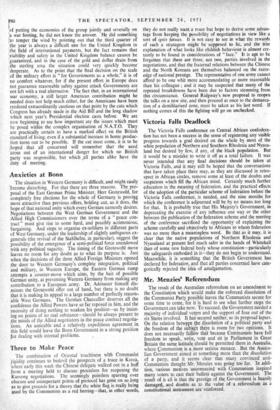Anxieties at Bonn
The situation in Western Germany is difficult, and might easily ;become disturbing. For that there are three reasons. The pro- posal of the East German Prime Minister, Herr Grotewohl, for completely free elections for the whole of Germany is provi9g more attractive than previous offers, 'holding out, as it does, the hope of that national unity which every German earnestly desires. Negotiations between the West German Government and the Allied High Commissioners over the terms of a "peace con- tract" must give rise to some hard, and possibly acrimonious, bargaining. And steps to organise ex-soldiers in different parts of West Germany, under the leadership of slightly ambiguous ex- generals (the revival of the Stahlhelm, in particular), sitggest the possibility of the emergence of a semi-political force unendowed with any political sagacity. The timing of the Grotewohl move leaves no room for any doubt as to what its purpose is. Just when the decisions of the three Allied Foreign Ministers opened the door to Western Germany's complete integration, political and military, in Western Europe, the Eastern German rump attempts a counter-move which aims, by the bait of possible German unity, at preventing Western Germany from making any contribution to a European army. Dr. Adenauer himself dis- misses the GrotewOhl offer out of hand, but there is no doubt that it is making its appeal to a large number of perfectly reason.% able West Germans. The Gerthan Chancellor deserves all the confidence the Allied Powers have so far reposed in him, and the necessity of doing nothing to weaken his position—as by insist- ing on points of no real substance—should be always present to 1the minds of the Allied negotiators in the peace contract negotia- lions. An amicable and a relatively expeditious agreement in this field would leave the Bonn Government in a strong position for dealing with internal problems.


































 Previous page
Previous page